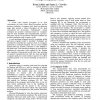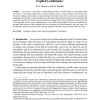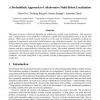79 search results - page 4 / 16 » A Genetic Algorithm for Mobile Robot Localization Using Ultr... |
142
click to vote
ICRA
1994
IEEE
15 years 7 months ago
1994
IEEE
A mobile robot requires perception of its local environment for both sensor based locomotion and for position estimation. Occupancy grids, based on ultrasonic range data, provide ...
165
click to vote
CEC
2007
IEEE
15 years 6 months ago
2007
IEEE
For a mobile robot to move in a known environment and operate successfully, first it needs to robustly determine its initial position and orientation relative to the map, and then ...
132
click to vote
ALGORITHMICA
2000
15 years 2 months ago
2000
Localization is the process of determining the robot's location within its environment. More precisely, it is a procedure which takes as input a geometric map, a current estim...
163
click to vote
ML
1998
ACM
15 years 2 months ago
1998
ACM
To operate successfully in indoor environments, mobile robots must be able to localize themselves. Most current localization algorithms lack flexibility, autonomy, and often optim...
119
click to vote
DAGM
1999
Springer
15 years 7 months ago
1999
Springer
This paper presents a statistical algorithm for collaborative mobile robot localization. Our approach uses a sample-based version of Markov localization, capable of localizing mob...



